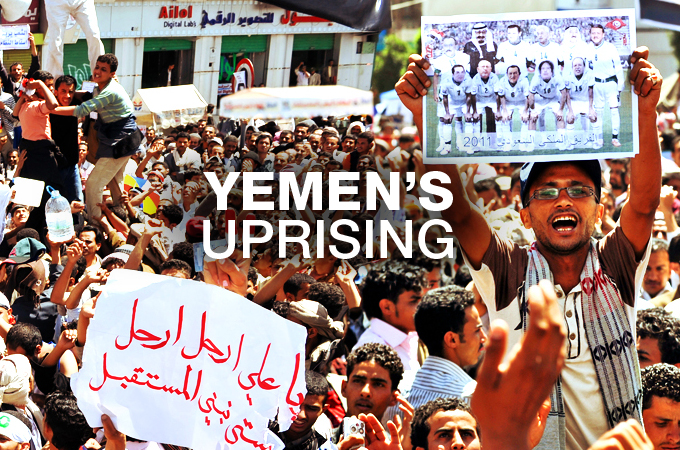Yemeni troops ‘open fire on protesters’
Reports of more clashes come as leaders of opposition bloc head to Saudi Arabia to discuss transition of power.

 |
| Anti-government protesters in Yemen remain unsatisfied with Saleh’s attempts at compromise [Reuters] |
Forces loyal to Ali Abdullah Saleh, the Yemeni president, have opened fire at an anti-government protest march in the capital Sanaa, wounding at least four people, witnesses say.
They said the shooting began when they tried to march in a street outside their normal protest zone on Sunday.
Wounded people were being rushed to hospital in ambulances and private cars.
Security forces deployed heavily in Sanaa where hundreds of thousands of men and women took to the streets in protest against Saleh’s call for an end to men and women joining together in anti-regime protests, and calling for his overthrow.
Protesters also took to the streets in the cities of Taiz and Ibb, south of Sanaa, and the Red Sea city of Al-Hudaydah, the organisers said.
Saleh has struck a defiant tone by calling the opposition liars and bandits. He also appealed to religious sensitivities in the conservative Muslim country by criticising the mixing of unrelated men and women among Sanaa protesters.
The remarks enraged many Yemeni women, who took to the streets in their thousands in across the country on Saturday to protest against his comments, saying women’s participation in protests was a religious duty.
Transitional talks
Against this backdrop of continued unrest, Joint Meeting Parties, an opposition coalition formed in 2002, has said it would send a delegation to Saudi Arabia on Sunday to discuss with Gulf Arab ministers the transition of power in their country.
 |
“We have requested this meeting with the GCC states’ foreign ministers to explain our points of view on the Gulf initiative,” Yassin Noman, an opposition leader, told Reuters.
He said Mohammed Basindwa, a former foreign minister, would head the delegation.
Opposition leaders previously refused to join Gulf-mediated talks with Saleh’s representatives, saying they wanted to force him out within two weeks, because the Gulf plan did not include a quick or clear timetable for the transition of power.
The youth movement, which plays a prominent role in the anti-government demonstrations, said it remains unwilling to take part in any talks before president Saleh’s departure.
The Gulf plan announced a week ago appeared to promise Saleh immunity from prosecution, an issue that had proved a stumbling block in earlier talks that stalled. Saleh accepted the Gulf talks framework the next day.
More than 116 protesters have been killed in clashes with security forces since late January, and there are fears that the violence could escalate in the country, at least half of whose 23 million people own a gun.